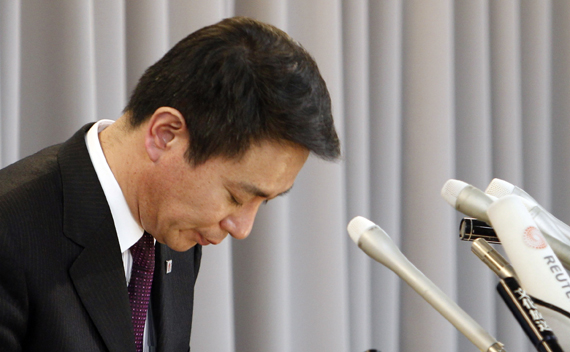Japan’s Loss
More on:

The abrupt resignation of Japan’s Foreign Minister, Seiji Maehara, has left the Kan cabinet reeling. Opposition party leaders smell blood and their gleeful calls for the prime minister’s resignation or for a general election suggest that the Democratic Party of Japan (DPJ) may be fatally wounded. But there is no victory here to be celebrated.
Japan’s project of political reform is badly served by this level of carnage. Seiji Maehara is not the first of the DPJ’s talents to be handicapped, nor is he likely to be the last. But he is one of Japan’s brightest political stars, and for virtually all outside of Japan, he was a reassuring presence in a party that came to power with few foreign policy experts in its ranks. Like other next generation leaders of the party, Maehara is intelligent, policy savvy—particularly in his favored area of foreign and security policy—and clear in his purpose of serving his country. Some argue he had his faults: he was outspoken and rushed to judgment. Chinese officials and media targeted him as too tough on China.
But he was clear and he was principled. His statements on the need to chastise his own party leadership, including former prime minister Yukio Hatoyama and Ichiro Ozawa, drew strong support from within and without his party. He himself acknowledged this weekend that he cannot trumpet the need for clean government if there are suspicions about his own management of his political funds.
Donations by an elderly Korean resident of Kyoto, known to him since he was a child, were the cause. Media reports total donations at around $3,000 over several years. Japan’s 469,000 residents of Korean ancestry are Japan’s largest ethnic minority, and have a complex history of national identity. As Japanese nationals up until the San Francisco Peace Treaty ended Japanese control over the Korean peninsula, many Koreans in Japan have lived their lives and raised their children as special permanent residents.
Mr. Maehara acknowledged that his friend from childhood did in fact donate money to his campaign. Shoji Nishida, an outspoken Liberal Democratic Party (LDP) parliamentarian who has earned quite a reputation for his verbal assaults in the Upper House of the Diet, forcefully brought home the case against Japan’s foreign minister for taking money illegally from “foreigners.” Cheers and jeers accompanied his attack on Maehara last week, and yesterday, television reporters had no shortage of opposition party leaders who were claiming this as evidence of their prime minister’s lack of leadership and his inability to exercise control over his cabinet.
This is not the first cabinet minister to exit the Kan government. Earlier this year, the prime minister watched his government lose another policy powerhouse, Cabinet Secretary Yoshito Sengoku, as the opposition honed in on his role in the Senkaku crisis with China. The younger Sumio Mabuchi, the minister of Land, Infrastructure, Transport and Tourism, also had to go. Both had been censured in the Diet, and thus were handicapped by the opposition’s tactics of blocking the legislative effort to pass the country’s budget.
The conventional wisdom in Tokyo is that this is all about the DPJ, and its weakness. Without a doubt, the internal party dynamics have rendered the Kan cabinet weaker than it ought to be. Last summer’s leadership contest between Kan and Ozawa seemed at first to have resolved the internal strife over the Upper House election results. But despite the outcome in Kan’s favor, the party remains deeply divided. The battle over Ozawa’s status in the party after his indictment has prompted 17 Diet members to leave the DPJ fold in the midst of the crucial battle over the budget.
But the mystery is this: The public wants better governance yet, amidst all of the talk of political reform by virtually every politician of every stripe, and in the face of the obvious need for politicians to play a constructive role in the policy making process, there still seems little appetite for working together. The policies being put forward by the DPJ—tax reform (including the need to raise the dreaded consumption tax), the opening of the country’s economic system (including the contentious TPP ambition), and the revamping of Japan’s social insurance system (where they have been successful at reform)—are all broadly supported within Japan. Yet, polling data shows a steady decline in Kan’s support rating. Diet deliberations have proven that the LDP, once the caretaker of Japan’s government, finds it just too difficult to do business with the DPJ. Likewise, they are getting little support from Japan’s voters.
At a time when Japan needs individuals with strong leadership potential, political leaders across the board in all parties—left and right—seems myopically focused on personality politics and short-term political gain. This corrosive game has become so devastatingly addictive for Japan’s politicians that there seems to be little consideration of the longer term consequences for Japan of this feeding frenzy.
Japan desperately needs reform. It needs strong and smart leaders who can navigate the complex—and rapidly changing—currents of global competition.
Japan desperately needs a forward leaning diplomatic and security strategy. It needs individuals who can advocate internationally on Japan’s behalf. And more than ever, it needs strategic thinkers.
Japan needs its next generation. They are smart and they are talented. And they are to be found across the political spectrum.
But this current frenzy of political ambition is becoming too costly. Japan can ill afford to turn on its own next generation of talented leaders. The stakes are too high.
More on:
 Online Store
Online Store